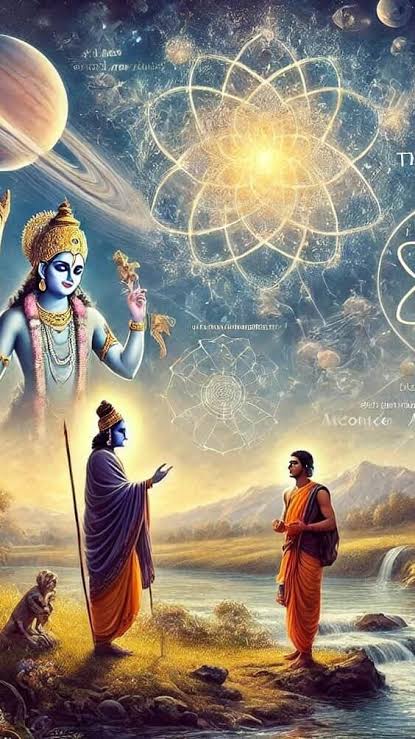
Bhagavad Gita quotes
Bhagavad Gita quotes
Here are some powerful and significant quotes from the Bhagavad Gita:
- “You are not the body, you are the soul.” (Chapter 2, Verse 30)
- This quote emphasizes the distinction between the physical body and the eternal soul (Atman), encouraging us to focus on our spiritual essence.
- “The soul is neither born, nor does it die.” (Chapter 2, Verse 20)
- Krishna teaches that the soul is eternal, highlighting the immortality of the soul and the transient nature of the body.
- “You have a right to perform your prescribed duties, but you are not entitled to the fruits of your actions.” (Chapter 2, Verse 47)
- This verse emphasizes selfless action and detachment from the results of one’s efforts, a key principle of Karma Yoga.
- “It is better to fail in one’s own Dharma than to succeed in the Dharma of another.” (Chapter 3, Verse 35)
- Krishna encourages following one’s own path, even if difficult, rather than imitating others, as true success lies in staying true to one’s own purpose.
- “Action is indeed better than inaction.” (Chapter 3, Verse 8)
- Krishna advocates for purposeful action, teaching that inactivity in the face of duty is more detrimental than engaging in righteous work.
- “The mind is restless, turbulent, strong, and unyielding. But by practice and detachment, it can be controlled.” (Chapter 6, Verse 34)
- The importance of mind control and meditation is underscored, suggesting that with discipline, one can achieve mastery over the mind.
- “A person who has mastered his mind is a true yogi.” (Chapter 6, Verse 47)
- Krishna points out that the true essence of yoga is mental discipline, not just physical postures, and mastery of one’s thoughts is the ultimate achievement.
- “I am the self, O Gudakesha, seated in the hearts of all creatures.” (Chapter 10, Verse 20)
- Krishna reveals his omnipresence, reminding us that the divine exists within every living being.
- “Surrender all your actions to me, with your mind focused on me.” (Chapter 18, Verse 66)
- This quote calls for complete surrender to the divine, trusting in the supreme will and letting go of ego and attachment.
- “I am the origin of all, the ultimate goal of all, and the eternal truth.” (Chapter 9, Verse 18)
- Krishna declares his position as the source and end of everything, emphasizing the interconnectedness of all existence.
- “He who is able to endure the storm of desire and anger is the true yogi.” (Chapter 5, Verse 23)
- Krishna teaches that a true yogi remains unaffected by desires and emotions, achieving peace through self-control.
- “One who has no attachment can really love.” (Chapter 12, Verse 15)
- Attachment, rooted in selfish desires, is seen as the opposite of true love, which is pure and selfless.
- “For the soul, there is neither birth nor death at any time.” (Chapter 2, Verse 20)
- Death is not the end for the soul, as it is immortal and transcends the physical body.
- “What is action? What is inaction? He who sees the two as one is a true yogi.” (Chapter 4, Verse 17)
- This quote illustrates the concept of detachment and transcendence of dualities, where a yogi perceives the essence beyond physical actions.
- “I am the eternal time.” (Chapter 11, Verse 32)
- Krishna reveals his cosmic form, affirming his identity as time, which is the great force of creation and destruction in the universe.
- “The one who has renounced attachment to the fruits of actions, who is free from desires, and who is unaffected by pleasure or pain, is said to have attained liberation.” (Chapter 18, Verse 66)
- This verse speaks of the power of renunciation and detachment from the results of one’s actions, which ultimately leads to spiritual freedom.
- “A person is said to be enlightened when they see the divine presence in all beings and treat them equally.” (Chapter 5, Verse 18)
- True wisdom lies in seeing the divine in all creatures, transcending distinctions of race, gender, or social status.
- “Those who are wise, and whose minds are fixed on Me, worship Me with undivided attention.” (Chapter 9, Verse 22)
- Krishna stresses the importance of devotion, where true devotees focus their minds completely on the divine without distraction.
- “The world is bound by actions, except when they are performed for Me.” (Chapter 9, Verse 26)
- Actions performed as offerings to the divine, with pure intentions, free one from the karmic bonds that tie them to the material world.
- “You came empty handed, and you will leave empty handed.” (Chapter 2, Verse 47)
- This verse reminds us of the impermanence of material possessions and the futility of attachment to them.
- “When meditation is mastered, the mind is unwavering, like the flame of a lamp in a windless place.” (Chapter 6, Verse 19)
- Krishna compares a focused and disciplined mind to a steady flame, signifying the calmness and stability that meditation brings.
- “Even a leaf, flower, water, or fruit offered with love and devotion is accepted by Me.” (Chapter 9, Verse 26)
- This highlights that the sincerity of devotion matters more than the material value of offerings, and true love and faith are always appreciated by the divine.
- “No one can be a true yogi if they do not possess self-control.” (Chapter 6, Verse 4)
- Self-control is a foundational aspect of yoga. Without it, a person cannot truly achieve spiritual progress.
- “In the material world, everything is subject to change; it is the nature of the universe.” (Chapter 2, Verse 14)
- Krishna teaches that change is an inherent part of life, and we must accept it without resistance to grow spiritually.
- “I am the self that dwells in the hearts of all creatures. I am the beginning, the middle, and the end of all beings.” (Chapter 10, Verse 20)
- The divine is present in every living being, emphasizing the interconnectedness of all life and the omnipresence of the divine.
- “The true yogi is the one who remains unaffected by happiness and sorrow.” (Chapter 6, Verse 22)
- The yogi transcends dualities, maintaining equanimity in both joy and sorrow, demonstrating spiritual maturity.
- “He who has no attachment to the fruits of his actions, and who works with full devotion, is a true yogi.” (Chapter 5, Verse 10)
- A true yogi acts without any attachment to the outcome of their actions, working selflessly and devotedly.
- “When a person gives up all desires and acts without attachment, they achieve peace.” (Chapter 2, Verse 71)
- Detachment from worldly desires leads to inner peace, allowing one to live harmoniously with the self and the universe.
- “The mind is the friend of the conditioned soul, and the mind is also the enemy.” (Chapter 6, Verse 5)
- The mind, when controlled, can be a great ally in achieving spiritual growth, but when left unchecked, it becomes a source of bondage and suffering.
- “The path of the selfless yogi, who has surrendered everything to Me, is the highest path.” (Chapter 9, Verse 22)
- The highest spiritual path is one of complete surrender to the divine will, where personal desires and ego are dissolved.
- “Those who are devoted to Me, with a pure heart and unwavering faith, are granted liberation from the cycle of birth and death.” (Chapter 9, Verse 22)
- Krishna assures that those who wholeheartedly devote themselves to the divine, with sincerity and faith, achieve liberation (moksha).
- “The true yogi sees all beings equally, whether in pain or pleasure.” (Chapter 6, Verse 29)
- A true yogi maintains an inner balance, viewing all beings with compassion, free from judgment or bias.
- “By selfless action, one can attain the supreme goal of life.” (Chapter 3, Verse 16)
- Selfless, dedicated action performed in alignment with divine will leads one toward liberation and fulfillment.
- “He who is not disturbed by the material world and who is unaffected by pleasure and pain, is a true yogi.” (Chapter 6, Verse 23)
- A true yogi remains stable amidst the changing tides of material life, unaffected by external circumstances.
- “Let your work be done with the attitude of devotion to the divine.” (Chapter 9, Verse 22)
- Every action should be performed as an offering to the divine, transforming mundane work into a sacred act.
- “The person who has mastered their desires and acts according to the scriptures is the one who attains peace.” (Chapter 3, Verse 17)
- Mastery over desires and adherence to righteous principles lead to true peace, aligning oneself with the universal truth.
- “I am the taste in the water, the light in the moon and sun, the syllable Om in the Vedas, the sound in the air.” (Chapter 7, Verse 8)
- Krishna reveals that his divine essence pervades all elements of the universe, from natural phenomena to the sacred sounds of the scriptures.
- “The person who has conquered the mind and has mastered self-discipline is a true yogi.” (Chapter 6, Verse 10)
- Victory over the mind and self-control is the foundation of spiritual growth, leading one towards true yogic wisdom.
- “The world is bound by desire; it is only by detachment that one can be free.” (Chapter 3, Verse 9)
- Desire is the root of attachment and suffering. Detachment leads to liberation from worldly bonds.
- “Whoever has self-control and does not indulge in the senses is truly the greatest of all yogis.” (Chapter 6, Verse 47)
- The highest form of yoga is achieved through mastery over the senses, transcending worldly temptations.

2 thoughts on “40 powerful Bhagavad Gita quotes”